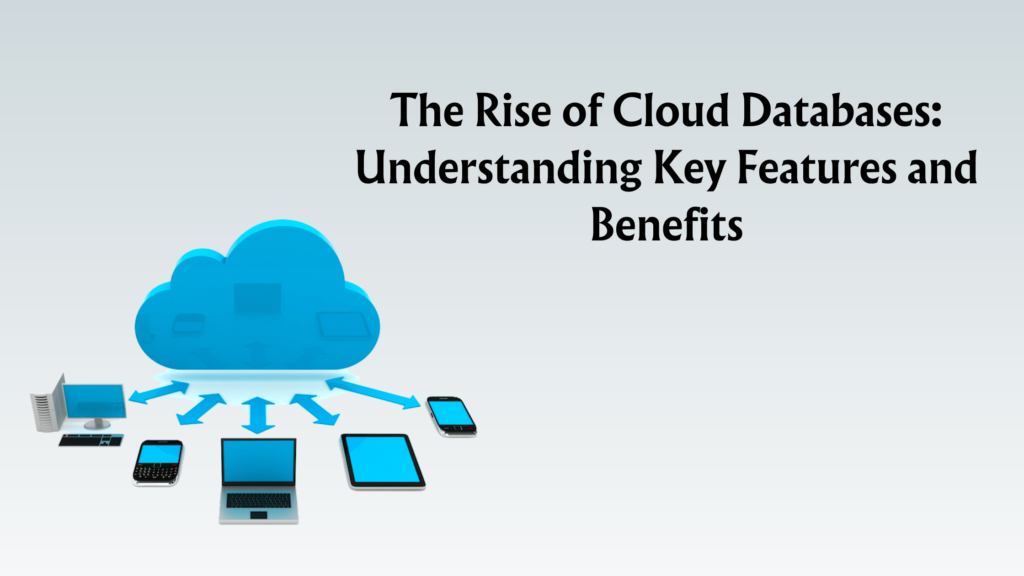Understanding Cloud Databases: Features and Benefits

Introduction
In recent years, cloud computing has revolutionized the way businesses manage their data. One crucial aspect of this transformation is the advent of cloud databases. Cloud databases provide scalable, flexible, and cost-effective solutions for storing and managing data in the cloud. In this blog post, we will explore what cloud databases are, their key features, and the benefits they offer to businesses of all sizes.
What is a Cloud Database?
A cloud database is a type of database service that is hosted on a cloud platform and accessible through the Internet. Unlike traditional on-premises databases, cloud databases eliminate the need for businesses to invest in physical infrastructure, maintenance, and administration. They offer a pay-as-you-go model, allowing organizations to scale their storage and computing resources based on their needs.
Key Features of Cloud Databases
1. Scalability and Elasticity One of the primary advantages of cloud databases is their ability to scale and handle varying workloads. Cloud providers offer scalable storage and processing resources, allowing businesses to increase or decrease capacity as required. This scalability ensures high availability and performance, even during peak usage periods.
2. Data Replication and High Availability Cloud databases often employ data replication techniques to ensure data redundancy and fault tolerance. Multiple copies of data are stored across different servers and geographic locations, minimizing the risk of data loss and providing high availability.
3. Automatic Backup and Disaster Recovery Cloud databases typically offer automated backup and disaster recovery capabilities. Regular backups are performed to secure data and allow easy restoration in case of accidental deletion, hardware failures, or other unforeseen incidents. These features provide businesses with peace of mind and reduce the risk of data loss.
4. Security and Compliance Cloud database providers implement robust security measures to protect sensitive data. They employ encryption techniques, access controls, and regular security audits to ensure data privacy and comply with industry regulations, such as GDPR or HIPAA. These security features make cloud databases a viable option for organizations dealing with sensitive information.
5. Global Availability and Accessibility Cloud databases are accessible from anywhere with an internet connection, allowing businesses to expand their operations globally. Multiple data centers spread across different regions enable low-latency access to data, ensuring optimal performance for users worldwide.
Benefits of Cloud Databases
1. Cost Efficiency Cloud databases follow a pay-as-you-go model, eliminating the need for large upfront investments in hardware and infrastructure. Organizations can save costs by only paying for the resources they use, reducing the total cost of ownership.
2. Scalability and Flexibility Cloud databases allow businesses to scale their resources based on demand. Whether it’s handling seasonal spikes or accommodating business growth, organizations can easily adjust storage and computing capacity, ensuring optimal performance at all times.
3. Simplified Management and Maintenance Cloud database providers handle the infrastructure management and maintenance tasks, such as hardware upgrades, software patching, and security updates. This frees up valuable resources and allows businesses to focus on their core competencies.
4. Improved Collaboration and Data Sharing Cloud databases enable seamless collaboration by providing real-time access to data for distributed teams. Multiple users can work simultaneously on the same dataset, facilitating teamwork and enhancing productivity.
5. Continuous Innovation and Upgrades Cloud database providers regularly introduce new service features and enhancements. Businesses can take advantage of these updates without the need for manual installations or disruptions to their operations, ensuring they stay up to date with the latest technological advancements.
Conclusion
Cloud databases have emerged as a game-changer in the world of data management. Their scalability, high availability, security, and cost-efficiency make them an attractive option for businesses of all sizes. By adopting cloud databases, organizations can leverage the benefits of cloud computing while focusing on their core competencies, improving collaboration, and gaining a competitive edge in today’s data-driven world.

Leave a Reply